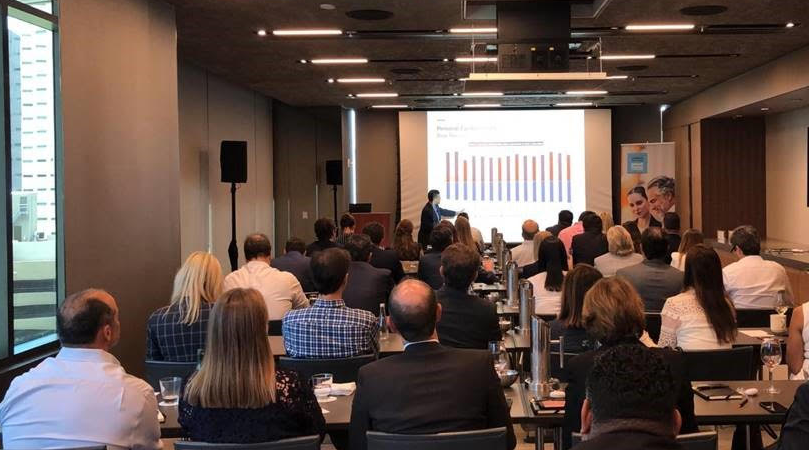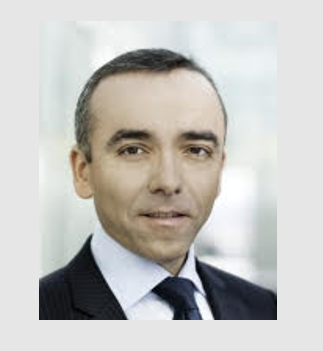Funds Society Investments & Golf Summit: Ideas on Global and Multi-Asset Fixed Income as a Source of Income
| By Alicia Miguel | 0 Comentarios

The sixth edition of the Investments & Golf Summit organized by Funds Society, and held at the Streamsong Resort and Golf, in Florida, left us with the best proposals of nine asset management companies in the field of equities, structured products and real estate, and also in fixed income and multi-asset funds.
Janus Henderson, RWC Partners, AXA IM, Thornburg IM, Participant Capital, Amundi, M&G, Allianz Global Investors and TwentyFour AM (Vontobel AM) were the participating management companies in an event which brought together over 50 fund selectors from the US Offshore market.
In the area of fixed income, Thornburg Investment Management and TwentyFour (Vontobel AM) took center stage. Danan Kirby, CFA, Portfolio Specialist at Thornburg Investment Management, spoke about the challenges faced by that particular asset and presented a flexible and multisector debt strategy. Among these challenges is the difficulty of predicting interest rates in an environment in which consensus seems to agree that rates are at very low levels and the cycle of increases has been “incredibly” slow, but in which investors should, nevertheless, avoid making comparisons with the past, since the path of these increases cannot be known. And experience shows that the market has been wrong many times. Also, among the challenges of investing in debt, the credit spreads, both in investment grade and in high yield, don’t compensate for risks taken and, in addition, they have improved after widening at first, following the Fed’s halt on the interest rate hikes cycle, due to low growth. What is real and what is not? The asset manager wonders.
Another challenge in fixed income is differentiation, since not all the names with a BBB rating, which makes up a large part of the investment grade universe, are the same: “Credits within the most defensive sectors with lower leverage should be better positioned while we approach the final phases of the credit cycle,” says the asset manager. And, as if that weren’t enough, global investors face a changing scenario in which they are forced to take more interest rate risks in so far as yields remain low. In this challenging environment, the asset manager proposes solutions: a flexible strategy with a relative value perspective to look for opportunities with a good risk / reward basis.
And this is the field of the Thornburg Strategic Income fund, focused on obtaining total returns through a portfolio which has the liberty to invest globally in all fixed income sectors, and which seeks a strong risk adjusted return by investing in the best relative value opportunities without benchmark restrictions. “When managing a scenario with volatility, investors need to incorporate a broader range of strategies that offer flexibility. A more complex global scenario and a greater frequency of risk off-risk on sentiment will create opportunities for flexible investors,” he adds. The asset manager explains that they are flexible and that they invest in bonds that offer attractive relative value as compared to the universe, have good fundamentals, and can add diversified exposure to risk. Currently, they invest in a variety of segments such as bank loans, common stocks, preferred stocks, foreign government bonds, domestic US treasury bonds, municipal bonds, investment grade and high yield (the highest positions) corporate debt, CMO, CMBS, Mortgage-pass through, agency bonds, ABS and liquidity.
The asset manager concludes that the market’s dynamic nature requires both experience and flexibility, and that a process of relative value provides opportunities to generate alpha, in all scenarios. “We only take risk where we are paid for it,” adds the expert, who explains that they do not use derivatives, use a bottom-up process, and analyze the capital structure of the companies in which they invest very carefully.
Global Fixed Income for Obtaining Income
TwentyFour AM, a boutique firm of the Vontobel AM group specializing in fixed income and working with Unicorn in the US Offshore market, also presented a global and multisector fixed income strategy for obtaining income (TwentyFour Strategic Income Strategy), the main focus of which is precisely to provide such income through the positive effect of diversification and a truly global investment. The idea is to provide an attractive level of income along with the opportunity for capital appreciation, although capital preservation is key. It’s benchmark agnostic, has high conviction (less than 200 individual positions) and seeks global relative value in the portfolio, with active risk management (duration and credit, but taking out currency) and that adds value with both asset selection, as well as with top-down proposals.
“Fixed income can work well with an active management perspective. If you like corporate bonds, there is a lot to choose from and through analysis you can find out where it’s most attractive to invest. With fixed income the benefits of active management can be proven,” explains David Norris, Head of the company’s US Credit team. Currently, around 30% of the portfolio has exposure to public debt (especially US debt, since it offers protection in a risk-off environment and also a decent return in an environment in which the macro vision indicates interest rate stability, with maturities of about five years) while the remaining 70% is in credit risk, mostly outside the US, with a lot of exposure in Europe and the United Kingdom (with names that pay more in the latter case due to the Brexit issue), but with shorter maturities, less than two years. “The cycle is getting old and although there is still value in credit it’s not like before, so we prefer not to take too much risk and therefore opt for short terms,” explains the asset manager. “It’s a reasonable environment for credit but we are cautious, and opportunities have been reduced compared to previous moments of the cycle,” he adds.
Banks weigh around a quarter of the portfolio, mainly due to the opportunities that the asset manager sees in Europe, with yields close to 7% with maturities of less than two years and a rating above BB. “The risk profile of banks is very attractive,” he says, and speaks of the large Spanish banks and some British that offer great value because they are not exposed to problem areas like Italy yet benefit from the premium provided by the Brexit issue. If analyzed with a global perspective, there are many areas that are attractive” he adds. As for emerging debt, they have some exposure, but this was reduced after the rally in recent months and only hold hard currency credit, since it’s in this segment that they show the greatest concerns. Also, as a risk, there is the possibility that commercial US banks do the tightening that the Fed doesn’t, causing the end of the credit cycle, although, theoretically, they don’t see any end of cycle signs in the US, nor of recession. In any case, they are vigilant, and the fund frequently shifts sectoral allocation if market prospects change.
Multi-assets: Winning Strategies
Also with a vision to generating income, but with a multi-asset perspective, Amundi Pioneer presented a solution for solving the income problem. “Traditional models of asset allocation oriented towards fixed income and equities can no longer produce the returns that investors need. Given the intervention of central banks, these figures will not return to historical levels. You have to find alternatives to debt in other assets in order to obtain more reasonable returns,” advised Howard Weiss, Portfolio Manager at Amundi Pioneer.
During the presentation he pointed out the attractiveness of Amundi Funds II-Pioneer Income Opportunities, originating in the US fund launched in 2012 aimed at obtaining income from a multi-asset perspective, as opposed to strategies, which tried to obtain income by focusing only on fixed income, because at that time it made sense (high-yield offered returns of 7%). But that compensation from the past has now disappeared: Over time, the spreads have been compressed, due to the continued interventions of central banks. Due to this lack of compensation, they have reduced their exposure to high yield in their strategy from over 44% in 2016, to around 13%. Equities offer a better value proposition for obtaining income: “We see conditions for the continuity of the economic expansion, for a longer cycle.” In order to create income from equities, and beyond dividends (in the case of these shares, they focus on the sustainability of the dividend, rather than on it’s being very high), they also opt for strategies such as equity linked notes. “Dividend strategies sometimes produce losses because cash flows are focused there, and the business deteriorates. We prefer to identify companies in difficulties, but that are in the process of rationalizing,” says the asset manager.
The strategy’s differential factor is the way in which the asset classes in which it invests are defined: At present, there are mortgage-backed securities, bank loans, emerging debt, US and international high yield, equity linked notes, bonds linked to events , MLPs, REITs (in Singapore and Europe…), emerging and developed world stock markets and hedging.
The objective of the strategy is to produce returns of around 4% and an appreciation of capital of 2%, so that annualized returns can reach 6%, although, even though it offers yearly income, capital appreciation will depend on the environment. “We only distribute what we produce, we will not consume capital,” says the asset manager.
Behavioral Finances
In multi-assets, M&G presented a strategy with a very differentiated approach: “There are two factors that move the market, fundamentals and economic beliefs, and these latter perceptions tend to change very quickly. In fact, sometimes the fundamentals don’t change, but the economic beliefs do,” explains Christophe Machu, Convertibles and Multi-Assets manager at the company. “Most of the time investors try to see where the benefits are going and try to make projections, but for this, you need better tools than those of your competitors and it’s difficult and arrogant to predict this data. That is why we focus much more on economic beliefs and their changes, that is, on investors’ perception,” he adds. Following these parameters, at the end of last year, for example, when the discussion wasn’t about whether a recession was coming or not (it will obviously come within the next two years, says the asset manager), but when it would come, they decided to take a contrarian vision and bet on shares, increasing their position, not because of the fundamentals but because of the change in the beliefs of the investors: it was a very good entry point, buying both US and foreign shares.
Thus, the strategy combines a framework of valuations with behavioral finances (episodes, events…), with tactical hedging, to establish its asset allocation and exploit irrational behaviors. As an example of the latter, explains the manager, volatility spikes tend to create opportunities for investment, helping long-term returns. One episode, he explains, has three characteristics: a rapid action on price, focusing on a single story, and presenting a price movement inconsistent with information flows: “It’s an opportunity where prices move for non-fundamental reasons,” explains the asset manager. In this way, without making predictions, and recognizing the importance of emotions, the strategy has managed to work well in different scenarios and market cycles: In optimism from 2000 to 2003, in the technology bubble, during which they cut back on equities and bet on bonds, in the subsequent crisis, and in the next period of compression of yields and recovery, in which they bet and benefited from the rally in all the assets… “We are now at a stage of compression in the risk premium of the shares, which means that the gap between the yield of the shares and the bonds is too wide,” says the manager.
With respect to their market vision, taking advantage of the pessimism of the end of last year, they increased equities, although they have subsequently reduced positions, due to the normalization of investor sentiment. “The last big change now has been the Fed, which has paralyzed rate hikes. If real rates remain at zero levels in the US, it will be good for emerging bonds, which have not moved much yet, and for stocks, especially outside the US. (in Asia, Japan and Europe). From a tactical perspective it is not as good as in December but from a strategic perspective it is.
The M&G Dynamic Allocation fund has an exposure of 41.8% to global equities, which means an overweight position, although it has been reduced and is centered outside the US. In fixed income, the bet focuses on emerging debt and is negative on public debt. “We prefer to take risk in stocks on credit,” assures the manager, who remembers that they are not stock pickers, and that they can make changes in asset allocation very quickly with index futures.










